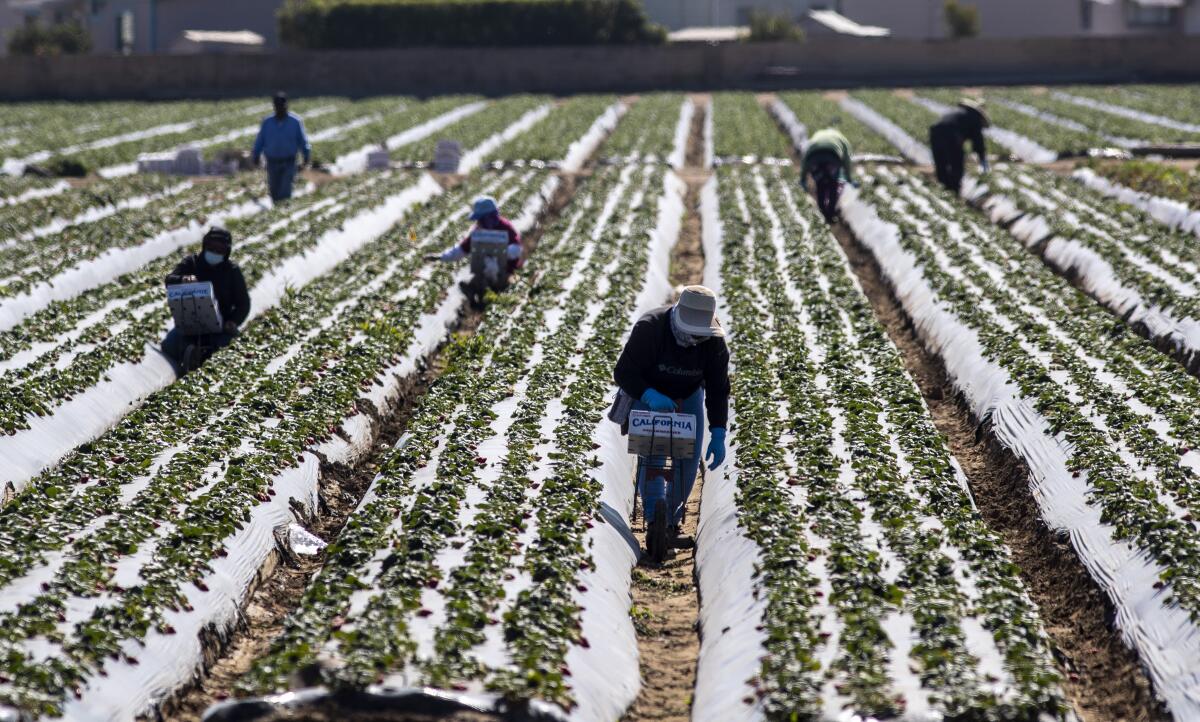Immigration reform that Republicans can love, or at least vote for

- Share via
Congress is in the middle of an active lame-duck session. A bipartisan coalition of senators has affirmed marriage equality and 16 Republicans in the upper chamber have signaled they’ll join Democrats in supporting the Electoral Count Reform Act. With the dust settling on the midterm elections and a few retirements around the corner, cooperation is in the air.
Immigration advocates are seizing on this rare burst of bipartisanship to push for legislative possibilities that have been lurking near the finish line for the past two years. While a permanent resolution for Dreamers might grab the most headlines, the pending bill with the potential for broadest bipartisan support is the Farm Workforce Modernization Act.
Having passed the House with the support of 30 Republicans and all but one Democrat, it is now before the upper chamber, where Democrat Michael Bennet of Colorado and Republican Michael Crapo of Idaho have been negotiating a Senate version that could meet the threshold for a floor vote any day.
For the last 10 years, people who came here as children but have no legal status could live relatively normal lives through a program called DACA. Its future — and theirs — remains unclear.
The House legislation represents hard-fought compromises. It aims to provide a path for legalization for the millions of undocumented agriculture workers currently in the United States. At the same time, it simplifies and enhances the existing “guest worker,” H-2A visa program for the agricultural sector, making it easier for farmers and ranchers to import foreign labor and making improvements in some working conditions for temporary employees.
Broad Democratic support is a given. The party has long sought to address the precarious status of undocumented farm laborers and to reform aspects of the H-2A guest worker program. Some Democrats would prefer more and faster benefits for immigrant farmworkers, but they still delivered an almost unanimous vote in favor of the compromise act.
There are also compelling reasons why 13 Republicans in the House co-sponsored the bill, and their party colleagues in the Senate should join them in supporting it. The Farm Workforce Modernization Act addresses a multitude of conservative values and concerns.
According to the U.S. Department of Labor Consumer Price Index November report, Americans haven’t faced food inflation this high since 1979, with prices rising 11.4% in the last year. Inflation has been front and center for nearly every Republican over the last year and the proposed legislation has the potential to help address rising food costs in a meaningful way.
The Border Patrol needs reform. Too bad the man with the experience to do it got pushed out by the Biden administration.
A September report from the Cato Institute detailed how reforms built into the legislation would reduce agricultural labor costs by about $1 billion in the first year and $1.8 billion in the second, “which would lead to more workers hired, more productivity, and lower prices for consumers.”
Republicans also champion E-Verify, the web-based system that allows employers to confirm that employees are eligible to work in the U.S. This bill makes an E-Verify program mandatory for all agricultural workers 30 days after the executive branch sets the final rules for administering the legislation. It also outlines changes to the verification process, including a photo-matching system, that will likely make it better at identifying unauthorized workers.
Also important to the prevailing Republican position, the legislation underscores that certified agricultural workers remain ineligible for many forms of federally funded public benefits, such as healthcare subsidies, while at the same time, bringing many more agricultural workers into the tax-paying world, increasing revenue for states as well as the federal government.
Finally, it will be rural America, where the GOP thrives, that will benefit most directly from this legislation. In addition to increasing tax revenue in some deeply red states, the legislation will stimulate rental and real estate markets throughout rural communities with 10 years’ worth of farmworker housing vouchers and grants, as well as funding for new housing developments.
Here’s how the legislation passed by the House would work:
A coalition of conservative-leaning states is trying to keep in place a Trump-era public health rule that allows many asylum seekers to be turned away at the southern U.S. border.
Longtime, law-abiding undocumented agricultural workers will be able to apply for certified agricultural worker status, which means they could come out of the shadows and work legally.
CAW candidates would not be subject to deportation while their applications are considered and employers would not be sanctioned for having previously hired them.
Certification would grant 5½ years of legal residency (including for workers’ dependents), with the possibility of an extension. Certified agricultural workers who meet further residency and work history requirements could apply to become permanent legal U.S. residents, and after that, they could apply for citizenship.
Those who don’t qualify for CAW status would be given access to H-2A visas, like newly hired foreign workers. Those already here would not be required to return to their home country to apply for the H-2As, as they are today. This common-sense change would cut down on labor supply disruptions.
Colombia wants the Biden administration to grant temporary legal status to its citizens now living in the United States.
The legislation also streamlines the H-2A process for employers, sets wage standards for agricultural workers, and establishes the rate at which those wages can grow — all tools for stabilizing labor costs — in the long term.
Under the new law, H2-A agricultural workers are guaranteed minimum hours, implementation of “heat illness protection” plans to avoid serious injuries while working, and the freedom to leave one employer to work for another — something they’re currently prohibited from doing, which suppresses wages for all workers. Not only is housing addressed for farmworkers, but so is transportation in and out of the fields.
Republicans often emphasize that immigrants should have to “get in line and wait their turn.” The Farm Workforce Modernization Act honors that idea but also acknowledges the crucial undocumented workforce that is already here. Through the proposed CAW program and changes in H-2A visa rules, the legislation establishes serious residency and work requirements before immigrants can gain a safe and stable place in society.
This legislation is an opportunity to address an important piece of our broken immigration system, to fill farm labor gaps and meet priorities for both parties. Because the bill has already passed the House, it creates a special opportunity during the lame-duck session for the Senate. If the upper house does not act, the opportunity dies when the session ends.
DW Gibson is the research director at Ideaspace.com and the author of “14 Miles: Building the Border Wall.”
More to Read
A cure for the common opinion
Get thought-provoking perspectives with our weekly newsletter.
You may occasionally receive promotional content from the Los Angeles Times.










